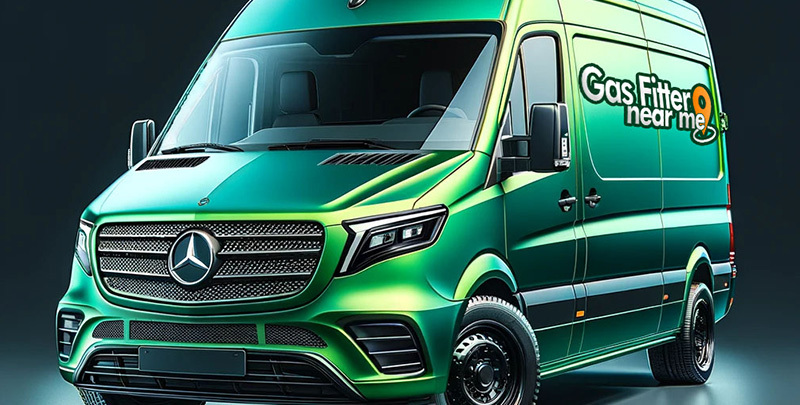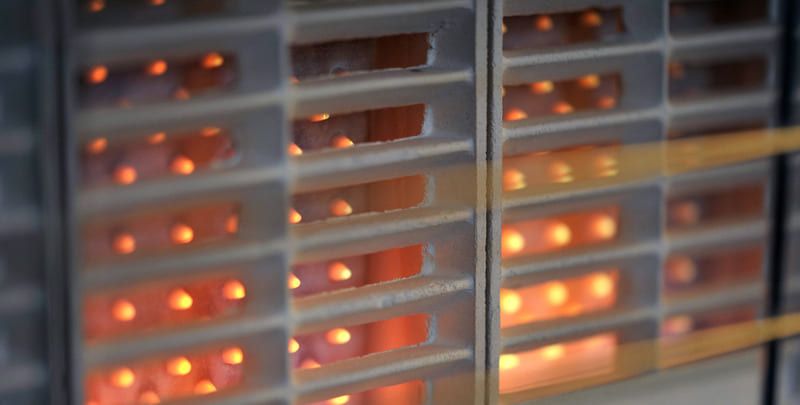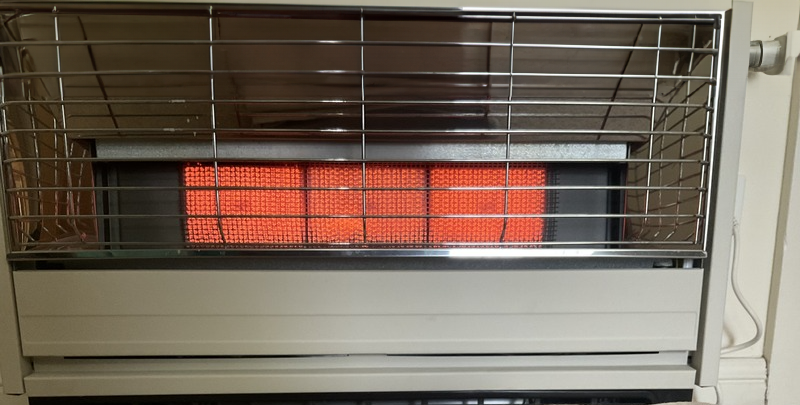Are Gas Heaters Bad for Your Health?

As winter sets in, many Australians rely on gas heaters to keep their homes warm and cosy. However, there are growing concerns about the health implications of using gas-heating appliances.
Gas heaters, especially unflued models, can cause indoor air pollution. Without proper ventilation and regular maintenance, indoor air pollutants such as carbon monoxide (CO) can accumulate, posing potential health risks from carbon monoxide exposure. Understanding the dangers and implementing safety measures is crucial for ensuring safe and healthy indoor air quality.
This article explores the question “Are gas heaters bad for your health?” and what steps can be taken to minimise risks to health and safety.
How Gas Heaters Work
Gas heaters generate warmth by burning natural gas or LPG (liquefied petroleum gas). This combustion process produces heat plus by-products such as carbon dioxide and water vapour. The heat then gets circulated to provide an efficient source of warmth during colder months in any indoor space.
There are two main types of gas heaters:
- a flued gas heater and
- an unflued gas heater
Flued gas heaters expel exhaust gases outside through a vent, reducing indoor air pollution. Unflued gas heaters, however, release these by-products directly into the inside atmosphere. While unflued heaters are more convenient and easier to install, they can produce indoor air pollution if not used properly.

Potential Health Risks of Carbon Monoxide Exposure
Using an unflued gas heater can pose several health risks, primarily due to the emission of harmful pollutants. One of the most serious concerns is carbon monoxide poisoning, which occurs when you burn gas fuel in confined spaces. Along with other pollutants like nitrogen dioxide, CO can directly affect health, particularly in individuals with childhood asthma or other pre-existing conditions. Symptoms of carbon monoxide poisoning include (but are not limited to):
- headaches
- dizziness
- chest pain
- (in high concentrations) possible death
Installing a carbon monoxide alarm is essential for detecting this dangerous colourless and odourless gas. For safer alternatives to an unflued or an open flued gas heater, consider using electric heaters, a reverse cycle air conditioner, or a flued gas heater that vent exhaust gases outside.
Outdoor Gas Heaters
When it comes to outdoor heating, patio heaters offer a cosy and convenient solution with slightly reduced health risks compared to indoor gas heaters. Since they are used in open-air environments, outdoor gas heaters significantly minimise the danger of carbon monoxide exposure. The fresh air circulation outdoors ensures that any emitted gases dissipate quickly, preventing harmful build-ups.
Whether you’re hosting a garden party or simply enjoying a quiet evening on the patio, these heaters provide warmth without quite so much of the worry. Remember, while outdoor gas heaters are generally safer, it’s always important to follow the manufacturer’s guidelines to ensure safe and efficient operation.

Safety Measures and Best Practices
Regular maintenance of gas appliances is necessary to prevent malfunctions and ensure they operate safely. A faulty gas heater can leak dangerous gases, so it’s important to have your gas heater serviced regularly by a licensed gas fitter to maintain a safe indoor environment.
Proper Ventilation to Reduce Indoor Air Pollution
Proper ventilation is essential when using gas heaters to ensure safety and maintain healthy indoor air quality. Gas heaters can release harmful pollutants into the air, which can accumulate without adequate ventilation. Opening windows and using exhaust fans can help disperse these pollutants and draw fresh air inside.
Regular maintenance of gas heaters is crucial to prevent malfunctions and reduce the risk of dangerous gas leaks such as carbon monoxide spillage. It is important to have your heater inspected and serviced regularly by a qualified professional to ensure it operates safely. Installing CO alarms provides an additional layer of safety by alerting you to dangerous levels of carbon monoxide.
In colder climates, maintaining proper ventilation can be challenging but is no less important. Even during the winter months, it’s vital to ensure enough airflow to prevent the build-up of harmful gases. Consider alternative heating options that do not produce indoor air pollutants. They can be a safer choice for maintaining a healthy home environment.
Regular Maintenance of Flued and Unflued Gas Heaters
Regular maintenance of gas heaters is crucial to ensure they operate safely and efficiently. Scheduling routine inspections and servicing by a qualified professional can help detect and address potential issues early, ensuring your heater functions properly.
Installing carbon monoxide alarms is an essential safety measure. These devices can alert you to dangerous CO levels and provide an added layer of protection.
Proper installation and consistent maintenance practices can significantly reduce the risk of accidents and health hazards. Adherence to maintenance schedules is key to ensuring you use your gas heater safely. This approach not only enhances safety but also prolongs the lifespan of your heating systems.
Take Care With Your Gas Heater
While gas heaters are an effective way to keep your home warm, they come with potential health risks if not used and maintained properly. Regular maintenance, proper ventilation, and the installation of carbon monoxide alarms are essential steps to ensure safety.
Considering alternative heating options, such as electric heaters or reverse cycle air conditioners, can provide safer choices for maintaining a warm and healthy home environment. By understanding and mitigating the risks associated with gas heaters, you can enjoy their benefits while protecting your health and well-being.
Please note: Thank you for reading our blog “Are Gas Heaters Bad For Your Health?”. This information is provided for advice purposes only. Regulations differ from state to state, so please consult your local authorities or an industry professional before proceeding with any work. See our Terms & Conditions here.